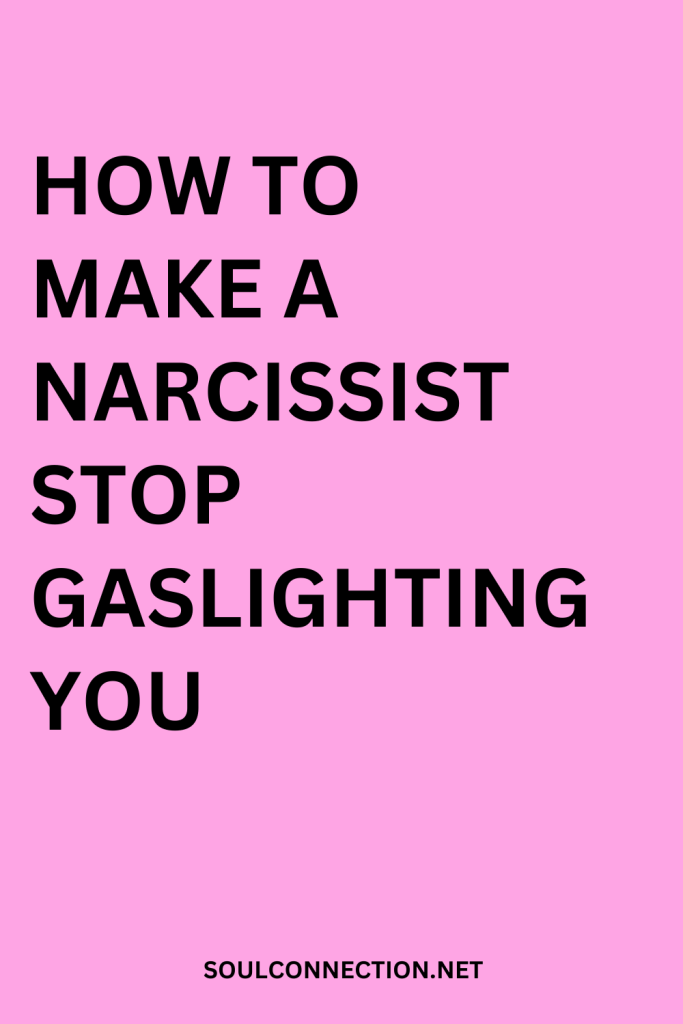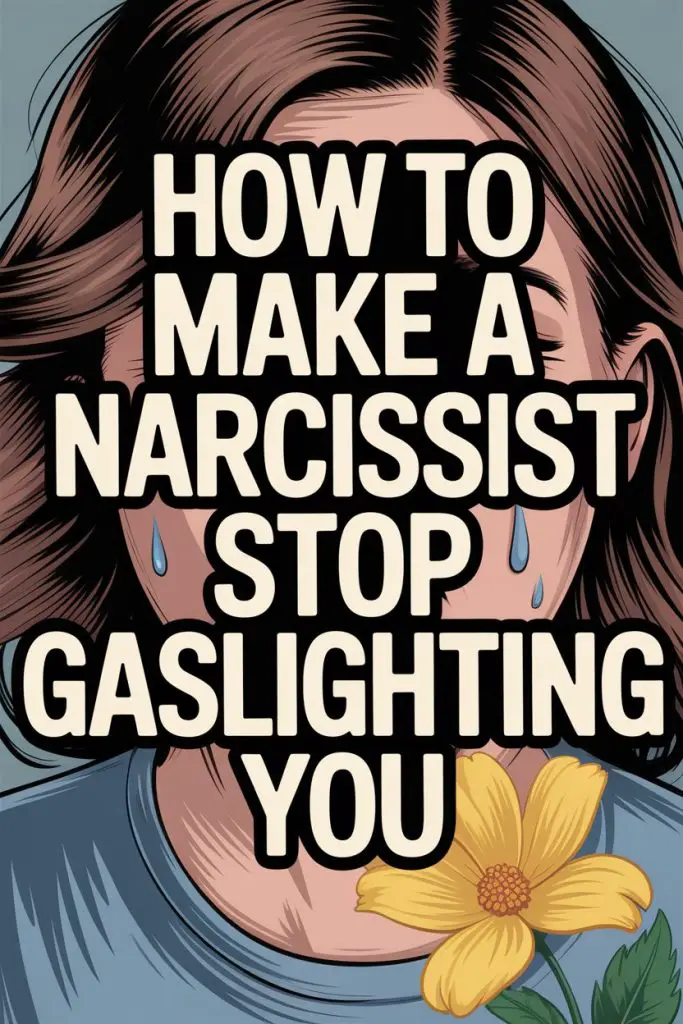Ever try arguing with a narcissist and leave the conversation wondering if you’ve been living in an alternate reality, or if they somehow replaced your brain with a hamster on a treadmill?
Welcome to the wonderland of gaslighting, where up is down, your feelings are “too sensitive,” and the only thing more elusive than an apology is a unicorn with a driver’s license.
Good news: It’s possible to stop a narcissist from steamrolling your sanity with their creative rewriting of history. It isn’t easy (if it were, therapists everywhere would be out of a job and I’d be writing about sourdough bread).
But with some tactical know-how, you can put a few potholes in their gaslighting superhighway—enough to regain your sense of reality and maybe, just maybe, stop doubting your own memory every time someone asks where you left your keys.
Here’s how to wrestle back your truth without losing your cool—or your mind.
Spot Gaslighting for What It Is
Gaslighting isn’t just a fun word to say when you’re feeling petty; it’s psychological manipulation with a side of emotional whiplash.
Narcissists use it to chip away at your confidence, make you question your memory, and leave you relying on their version of events.
Common telltale signs? Think: “That never happened.” “You’re too sensitive.” “Everyone knows you’re imagining things.” Or, my personal favourite, the dramatic eye roll followed by “You always twist my words.”
Naming it is half the battle. (The other half is not throwing your phone out the window.)
Don’t Argue With Twisted Logic
Picture this: You’ve caught them in a lie. You have receipts, screenshots, the works. Translation: You’re about to win this debate, right? Not so fast.
Narcissists excel at mental gymnastics. If the Olympics ever opened a gaslighting event, they’d take home gold every year.
Arguing with their logic is like wrestling a pig in mud—exhausting and ultimately pointless. Instead, state your perspective simply and clearly. No need to give them a PowerPoint.
Short, direct statements are harder to twist: “I remember it differently.” “That’s not how I saw it.” If they try to spiral you into a new argument, resist the urge to outwit. Silence, or a calm “We’re not going to agree,” works wonders.
Keep Receipts (Literally and Metaphorically)
Gaslighters rewrite history faster than Wikipedia editors on a sugar high. If you’re dealing with a pro, it pays to keep notes, texts, or emails when things get twisty.
This isn’t about building a case for Judge Judy. It’s about giving yourself a reality anchor when you start doubting your own recollection.
Jot down dates, conversations, or anything that gets rehashed into something unrecognizable. If they say, “That’s not what I said,” you can check your notes instead of searching your soul for memory malfunctions.
Boundaries Are Your New Best Friend
A narcissist’s kryptonite? Boundaries. These aren’t just trendy buzzwords from your last therapy session; they’re your emotional safety rails.
Boundaries sound like: “I’m not willing to discuss this if you keep raising your voice.” Or, “We’re not having this conversation again.”
Think of boundaries like invisible fences—except instead of keeping the dog in the yard, you’re keeping your self-respect from wandering into the wilderness. Set them. Announce them. Stick to them.
It might feel uncomfortable at first, but it’ll get easier the more you practice.
Don’t Look for Validation Where There Is None
If you’re waiting for a narcissist to suddenly say, “Wow, you’re right, I was gaslighting you, how self-aware of me,” then you probably still believe in the Tooth Fairy, too.
Narcissists thrive on shifting blame and playing the victim. Seeking validation from someone committed to denying your reality is a guaranteed way to wind up feeling emptier than a politician’s promise.
Instead, trust your gut. Validate your own feelings. If you need outside confirmation, call a trusted friend or therapist. Let’s face it, your narcissist isn’t about to hand you a gold star for emotional honesty.
Practice the Grey Rock Method
Emotional fireworks are a narcissist’s favorite pastime.
The more you react, the more they dance. The grey rock method is the opposite of that: you make yourself as boring and un-engageable as a brick wall at a paint-drying contest.
When they try to provoke or bait you, respond with flat, minimal answers. No emotional fuel; no rise; just “uh-huh,” “okay,” or (if you’re feeling especially spicy) “noted.”
Over time, many narcissists lose interest when they can’t get a reaction.
Find Allies Who Know the Drill
Even the most resilient among us start questioning reality when it’s being updated more often than your iPhone.
Surround yourself with a few allies—friends, family, a therapist—who get it. Someone who’ll say, “Yep, that’s classic gaslighting,” when you need reassurance you’re not losing your marbles.
Sometimes, just hearing “That’s messed up” from someone you trust is enough to keep your footing. Consider it your sanity snack.
Self-Care Isn’t Just Bubble Baths
Taking care of yourself when you’re dealing with a gaslighter goes beyond the occasional spa night. It means protecting your energy, getting enough sleep, and feeding your brain something other than self-doubt.
Meditation, exercise, walking, knitting hats for hamsters—whatever helps you feel grounded and connected to yourself, do it.
Think of it as fortifying your mental immune system. Fewer cracks for gaslighting nonsense to seep through.
Know When to Walk Away
Sometimes the healthiest response is also the hardest: walking away.
If repeated boundary-setting, reality checks, and all your best efforts just result in more mental gymnastics, it may be time to consider putting some distance between you and the gaslighter—emotionally, physically, or both.
This doesn’t mean you failed. It means you recognize your worth and refuse to rent your headspace to someone who refuses to respect it.
When Kids or Family Are Involved
Gaslighting gets extra complicated when there are shared responsibilities like children, aging parents, or a joint Netflix account. If you can’t limit contact, tighten up your boundaries even more and stick to neutral ground in conversations.
Use email or text to keep a record. Make plans and agreements in writing—no room for “I never said that.” If possible, rope in a third party for important discussions.
Your priority: Protect your kids’ sense of reality and your own sanity. And yes, you can do that without being dragged into every tug-of-war.
Protecting Your Peace
Life with a narcissist gaslighting you can feel like living in a hall of mirrors. Every reflection is distorted, and just when you think you’ve found the real exit, the walls move again.
Being gaslit isn’t just frustrating; it’s exhausting. But you can draw a line in the sand, firm up your sense of self, and start trusting your memories again—even if you never remember where you left your sunglasses.
Reclaim your narrative. Practice saying, “That’s not how I remember it,” without flinching. Stand in your own reality, even if you have to stand alone sometimes.
You’ll be amazed at how freeing it is when you stop playing tug-of-war with someone who never planned to let go of the rope.
And if all else fails, know this: Sometimes the healthiest thing you can do is step out of the funhouse, catch your breath, and remind yourself—your reality is valid, no gaslighter required.


